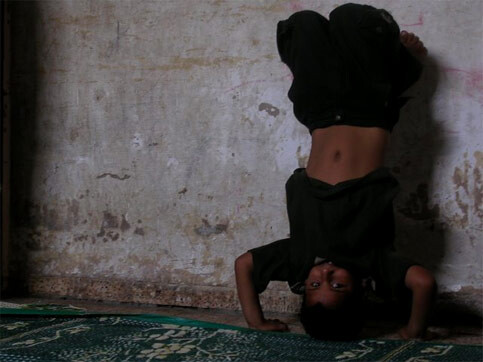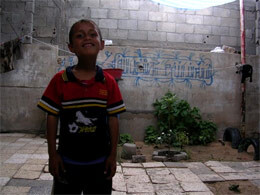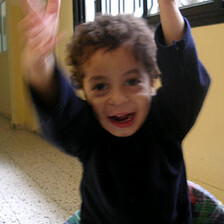
Hamza Albalawi keeping busy in his home in Beit Lahiya, 30 May 2007.
Jamal’s car was sounding more and more rickety I noticed as we drove to his house for lunch. He was late since he had spent the entire day at the Rafah border with some neighbors who were trying to cross to Egypt for medical care. They had gotten there at the crack of dawn only to turn back in the late afternoon without success. Of the thousands gathered a select few had made it across, but they were not among the lucky few. I have to be honest, I have no idea what the hell must be like crossing that border because I have never had the privilege or bad fortune to attempt to do so. When it is actually open, only Palestinians are permitted to cross.
The Rafah border is operated by Palestinians on one side, by Egyptians on the other and has a European mission monitoring the process on the Palestinian side. One of the more positive things to come of the Israeli disengagement is that they no longer man this border between the Gaza Strip and Egypt and yet Israel still controls it from a distance. On a daily basis the European mission is prepared to travel from their headquarters in the Israeli city of Ashqalon 45 minutes away to the Southern most tip of the Gaza Strip to allow passage for Gaza’s inhabitants to the rest of the world. All it takes for the trip and thus the operation of the border to be canceled is Israel’s discouragement from doing so — like the rest of Israeli decision making, for reasons of security precautions of course. Yesterday the border was open after almost two weeks of closure, whereas the agreement that was established between Israel, Palestine and the Egyptians was for its daily opening. When a report was written a year after the agreement was signed it had been closed during the final six months phase for 86 percent of the time. Jamal was exhausted and after a short lunch took a nap in the corner of one of the two rooms in his house.
Jamal’s oldest daughter had just finished her final exams; Hamza, Jamal’s favorite had completed kindergarten and was about to tear up his graduation certificate when I got hold of it. The others had just a few more days to go before the summer break. I asked them what they would do during the summer, “stay home” Maysa told me, “and visit my grandmother.” Om Daher’s mother lived a few houses away. Jamal had drawn a tarp across the open air sitting space in his courtyard to spare us a little from the sun. The boys were running around and his wife Om Daher would order them out of the room every time they got too rowdy. I couldn’t imagine the entire summer going by like this with none of them involved in any activity but being home.

Mohamed Albalawi smiles in front of graffiti on the wall of his Beit Lahiya home, 30 May 2007.
I learned that the large picture hanging on the wall was of Jamal’s recently deceased mother. For the past year he had not been to visit her because the cemetery she was buried in was located too close to the border with Israel. I knew Israel controlled water, airspace and borders, but in Gaza, even the dead are off-limits to visit.
All images copyright Philip Rizk.
Philip Rizk is an Egyptian-German who has lived in Gaza since August 2005 where he works and writes. Philip runs a blog: tabulagaza.com.
Related Links




